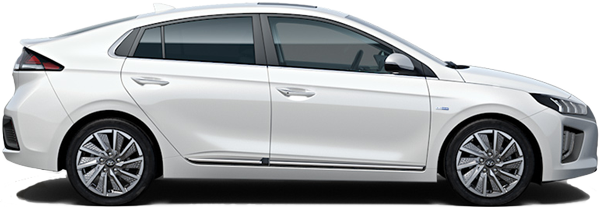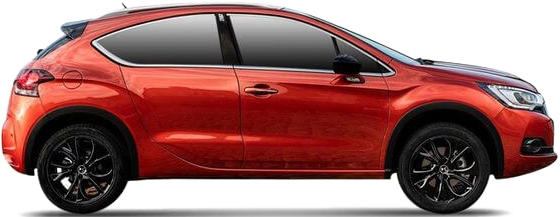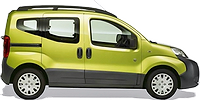The Comparative Analysis :
Hyundai IONIQ PlugIn-Hybrid (19 - ..) vs. DS Automobiles DS 4 PureTech 130 (15 - 18)
€ 32,000

€ 24,000

€ 32,000
Base Price ⓘBase price of a new vehicle with standard equipment in Germany at market launch.
€ 24,000
ⓘBase price of a new vehicle with standard equipment in Germany at market launch. Price Info
Vehicle Dimensions
The dimensions of these vehicles differ considerably. The Hyundai IONIQ PlugIn-Hybrid is 7.3 inches longer, 0.4 inches wider and 2 inches lower than the DS Automobiles DS 4 PureTech 130 Stop&Start.
Hyundai IONIQ PlugIn-Hybrid
DS Automobiles DS 4 PureTech 130 Stop&Start
57.1
71.7
81.1
59.1
71.3
80.8
71.7 in
Width
71.3 in
81.1 in
Width Incl. Mirrors
80.8 in
57.1 in
Height
59.1 in
106.3
176
102.8
168.7
176 in
Length
168.7 in
106.3 in
Wheelbase
102.8 in
Vehicle Weight
Hyundai IONIQ PlugIn-Hybrid
DS Automobiles DS 4 PureTech 130 Stop&Start
3461 lb
Curb Weight
2932 lb
4343 lb
Gross Vehicle
Weight
Weight
3946 lb

Weight Difference:
529 lb
15.28 %

General
Hyundai IONIQ PlugIn-Hybrid
DS Automobiles DS 4 PureTech 130 Stop&Start
AE
Generation
N
Hatchback
Car Body Style
Hatchback
Mid-Grade Unleaded
Fuel Type
Mid-Grade Unleaded

Front-wheel drive
Drivetrain
Front-wheel drive

6-speed dual clutch transmission
Transmission
6-speed manual transmission
Engine
Hyundai IONIQ PlugIn-Hybrid
DS Automobiles DS 4 PureTech 130 Stop&Start
4-cylinder plug-in hybrid gasoline engine (naturally aspirated engine)
Engine Type
Straight-three gasoline engine with turbocharger
4
Valves
4
4
Cylinders
3
1.6 L / 78 cu in
Displacement
1.2 L / 59 cu in
139 hp
at 0 rpm
Power
128 hp
at 5500 rpm
Hyundai IONIQ PlugIn-Hybrid
139 hp
128 hp
DS Automobiles DS 4 PureTech 130 Stop&Start
195 lb‑ft
at 0 rpm
Max. Torque
170 lb‑ft
at 1750 rpm
Hyundai IONIQ PlugIn-Hybrid
195 lb‑ft
170 lb‑ft
DS Automobiles DS 4 PureTech 130 Stop&Start
Performance
Hyundai IONIQ PlugIn-Hybrid
DS Automobiles DS 4 PureTech 130 Stop&Start
111 mph
Maximum Speed
123 mph
10.6 sec
Acceleration 0 to 62 mph
10.8 sec
62 mph
62
mph
mph
482 ft
0.000 sec

Hyundai IONIQ PlugIn-Hybrid
62 mph
62
mph
mph
492 ft
0.000 sec

DS Automobiles DS 4 PureTech 130 Stop&Start
▶ REPLAY
24.9 lb/hp
Weight-to-Power Ratio
22.91 lb/hp
Hyundai IONIQ PlugIn-Hybrid
24.9 lb/hp
22.91 lb/hp
DS Automobiles DS 4 PureTech 130 Stop&Start
Fuel Economy / Emissions
Hyundai IONIQ PlugIn-Hybrid
DS Automobiles DS 4 PureTech 130 Stop&Start
Fuel Economy
214 mpg
combined
48 mpg
Hyundai IONIQ PlugIn-Hybrid
214 mpg
48 mpg
DS Automobiles DS 4 PureTech 130 Stop&Start
No data
city
39 mpg
No data
highway
56 mpg
11.4 gal
Fuel Tank Capacity
15.9 gal
2429 mi
Range
761 mi
Hyundai IONIQ PlugIn-Hybrid
2429 mi
761 mi
DS Automobiles DS 4 PureTech 130 Stop&Start
Environmental Impact
20.8 kWh
Total Energy Consumption
per 100 miles ⓘThe total energy consumption per 100 miles is the amount of energy consumed by a vehicle when burning fuel or using electricity per 100 miles (final energy), and the energy required to produce the appropriate amount of fuel or electricity (primary energy).
per 100 miles ⓘThe total energy consumption per 100 miles is the amount of energy consumed by a vehicle when burning fuel or using electricity per 100 miles (final energy), and the energy required to produce the appropriate amount of fuel or electricity (primary energy).
92.9 kWh
Hyundai IONIQ PlugIn-Hybrid
20.8 kWh
92.9 kWh
DS Automobiles DS 4 PureTech 130 Stop&Start
Euro 6d-TEMP-EVAP-ISC (WLTP) 36CH, 36CI, 36DG
Emission Standard
Euro 6b (NEFZ)
42 g/mi (WLTP)
CO2 Emissions
180 g/mi (NEFZ)
Practical Convenience
Hyundai IONIQ PlugIn-Hybrid
DS Automobiles DS 4 PureTech 130 Stop&Start
5
Doors
5
5
No. of Seats
5
882 lb
Maximum Payload
1014 lb
9.7 cu ft
Trunk Volume
10.9 cu ft







39.7 cu ft
Cargo Volume (Seats Down)
No data

















